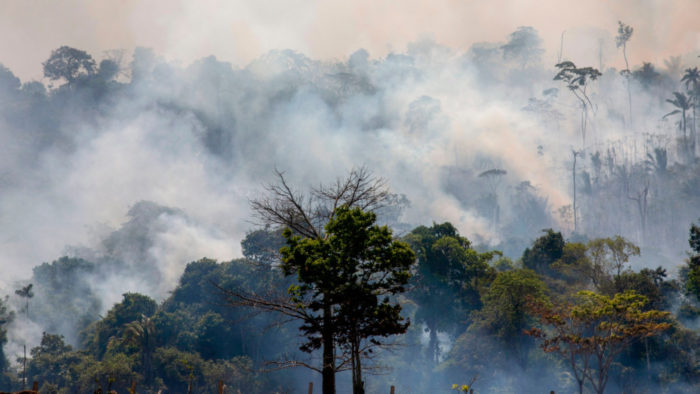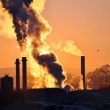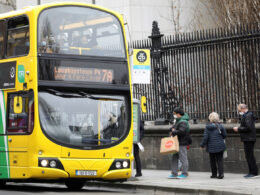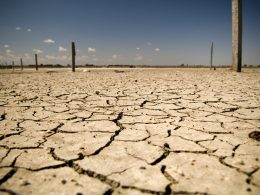By Bruna Leão, Liberdade, Socialismo e Revolução (our sister organisation in Brazil)
Since the 2018 elections, there has been a marked concern about the direction environmental policies would take should Jair Bolsonaro assume the presidency. Bolsonaro’s declarations on the environment have always been controversial, because they treat any consideration for the preservation of the forest or for indigenous peoples as something that hinders the country’s economic growth.
According to INPE (Brazil’s National Institute for Space Research), between August 2018 and July of this year, there were reports indicating that 6,800 km² were deforested, while in the same length of time between August of 2017 and July of 2018, the reports showed deforestation of 4,500 km², an increase of 64.8%. According to the government agency IBAMA (the Brazilian Institute of Environment and Renewable Natural Resources), they imposed one third fewer fines on environmental violators in 2019 than in the same period last year. The drop in the number of penalties coincides with a rise in the number of recorded instances of deforestation and forest fires in 2019.
The environmental chaos in which we live became evident on August 19, 2019, when the sky over the city of São Paulo darkened at 3:00 PM. This happened as a cloud of smoke arrived from the forest burns observed over 16 days in Bolivia, Paraguay, and the Brazilian states of Rondônia and Acre. The wind from the upper layers of the atmosphere changed direction with the entry of a cold front, directing the smoke towards São Paulo, but also to the southern region containing the states of Mato Grosso, Mato Grosso do Sul, and Paraná.
Wildfires are not uncommon at this time of year, but never at this scale. According to IPAM (Amazon Environmental Research Institute), this year was the least dry out of the past three, so dry weather can’t be blamed for the spike in fires. There was, however, a significant increase in illegal fires, by about 70%, that contributed to the growth in wildfire outbreaks in the Amazonian region.
The advance of deforestation is connected to the ecologically unsustainable hunt for profits on the part of the agribusinesses that today control the government. Even before the cuts to the Amazon Fund, we witnessed a drastic increase in wildfires in the Amazon forest. Data from INPE’s daily satellite imaging show that, just between August 18 and 19, 1,346 new outbreaks were spotted in the country. Since August 15, there have been 9,507 new burn points. The Bolsonaro administration had already been cutting IBAMA’s funds, particularly those that would go towards inspections and oversight. Then came the recent firing of the INPE director, who challenged the president by defending the technical and scientific data collected by the institute. Part of this same process of dismantling environmental protections are the cuts to public universities that produce the scientific understanding and professionals qualified to address the country’s environmental situation.
The intense thirst for profit at all costs, together with the strengthening of the “ruralist” bloc (representing the interests of the major landowners) in congress, the attacks on indigenous territories, and the crimes against the environment like the dam ruptures in Brumadinho and Mariana, make Brazil one of the world’s biggest deforesters and biggest users of pesticides. All this has intensified under the Bolsonaro government, which has declared war on the environment with its devastating policies.
Global Climate Strike
The climate strikes are a rapidly expanding phenomenon. They are marked by youth who are dissatisfied with the inaction of governments, and worried about their own future, reflecting a growing politicization among young people. A precursor movement to the climate strikes took place before the Paris Climate Conference in 2015. In more than 100 countries, around 50,000 people took to the streets, upholding banners that tied the environmental crisis with the broader social crisis. The deepening of climate fight began at the end of last year. It was sparked by a young Swedish girl named Greta Thunberg, then 15 years old. In August 2018, Greta began a series of protests that subsequently turned into the “Fridays for Future” movement.
A number of different movements in Brazil have decided to join in building for the Global Climate Strike, called in dozens of countries for the week of September 20. The mobilization here is also a response to the attacks the Bolsonaro government has launched against indigenous peoples, the Amazon, the Cerrado (vast tropical savannah region in central Brazil), agroecology, and any initiatives that propose a new relationship between human beings and nature. There is a strong level of participation, especially from young people, in the worldwide strike as a vehicle for expressing this indignation in the streets.
Fight for ecosocialism
This moment calls for building a new pole of attraction for the struggles of workers and young people for the environment. The state of São Paulo, like much of northeastern and midwestern Brazil, has already been through water-supply management crises (due to drought in recent years), is now experiencing widespread public-health problems related to air quality, and continues to suffer direct consequences on the environment and on quality of life as a function of the decisions of governments that seek benefit for themselves and not for the people.
There is an urgent need to engage in the environmental and climate struggle. Climate change will have disastrous consequences, particularly for the working class, such as landslides, forest fires, crop failures, hunger, disease, extreme rainfall, heatwaves, floods, and prolonged droughts. The priority for us on the left is to stand up to this short-sighted economic system, a system that ignores the need to conserve natural resources and is only motivated by profit. In his book Capital, Marx states that “all progress in capitalist agriculture is a progress in the art not only of robbing the worker, but of robbing the soil.”
The capitalist system is leading our world into chaos, and we must topple it! We can only change things by fighting for a socialist transformation of society, with working people in control. We already have the technical means to plan production in accord with our needs rather than profit, and we can establish a rational use of all the planet’s resources. This means fighting for a democratic socialist society, with a democratic planning of resources on an international scale. The construction of a force for ecosocialist struggle is the strategy required to respond to the attacks of the Bolsonaro government and of capitalism. Let’s build for the international climate strike in September, bringing together the forces of the youth, the working class, and all who are fighting against the destruction of our planet.












